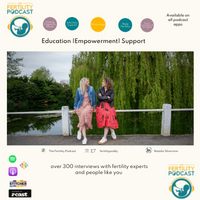What should you eat when trying to get pregnant?
It’s episode 2 of the relaunched pod! This week we’re talking about what to eat when you’re trying to conceive. This can be so overwhelming, and we want to make it easy for you to understand all you need to know. So, we’re chatting with the lovely Ro Huntriss who is a registered fertility dietician.
On the pod, we’ve spoken to a fair few people who know what they’re talking about when it comes to fertility and nutrition, but dieticians work slightly differently. Their focus is very much on evidence-based practice and their training to become a dietician involves clinical placements and training to support people with co-existing medical conditions. So, basically, they follow the medical model such as doctors, nurses, pharmacists, etc.
So, where do you start with nutrition when trying to conceive? Ro recommends that you consider your own diet and look at the changes that you feel will make your diet healthier. Keeping a food diary is a great thing to do and can give you a really good picture of what kind of foods you’re eating and where you might need to make some changes.
Let’s talk about egg health. It takes around 3 months to influence the health of the egg and some of the nutrients to include are folate (folic acid) - to help reduce the risk of neural tube defect and also help to improve egg development and quality. Omega 3 - in oily fish or as a supplement can play a huge part in improving egg quality. Antioxidants – from fruits, veg, wholegrains, nuts, seeds, and even in meat.
Ro also shares with us her recommendations for sperm health and how a Mediterranean diet and antioxidants are particularly useful such as vitamin C, E, Zinc, Selenium, and folate.
We get the low down on whether you should go gluten and dairy free – Ro makes it really clear that unless you’re a diagnosed coeliac, it is not recommended to be gluten-free to support fertility as there is not evidence to suggest that this is necessary. Wholegrain is an important part of our diet and needs to be included. If you’re worried you might be intolerant to gluten, ask your GP for a test before removing out from your diet to be sure. With regards to dairy Ro doesn’t recommend cutting it out unless necessary and if you do, make sure you get your plant-based dairy alternatives in.
We frequently talk about the importance of weight when trying to conceive and probably focus more on being overweight, however being underweight is also a consideration when it comes to fertility. Having a low BMI can cause irregular cycles and therefore ovulatory disorders. Ro recommends that if you’re underweight include olive oil, nuts, seeds, and avocado in your diet.
Is it sensible to follow a vegan diet when trying to conceive? Ro says yes but encourages you to have a review with a dietician or nutritionist if you’re struggling to conceive. What about restrictive diets? Ro discourages this as these low-calorie diets are so restrictive and research shows that people that follow these diets don’t get the best outcomes.
We’ll be catching up with Ro in the very near future to chat about preparing for IVF but in the meantime, you can find more about Ro here:
Ro Huntriss: https://dietitianro.co.uk
The Fertility Food Formula: https://fertilitydietitianuk.teachable.com/p/food-and-fuel-for-fertility-an-online-fertility-nutrition-course
Instagram: https://www.instagram.com/fertility.dietitian.uk/
Registered nutritionists
See acast.com/privacy for privacy and opt-out information.


